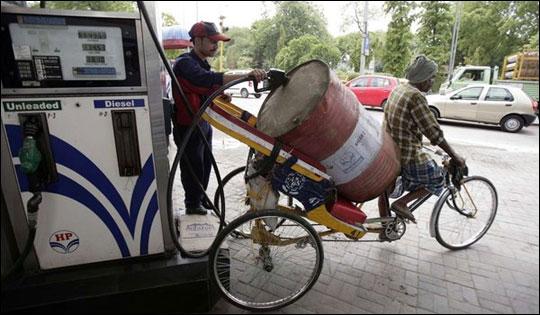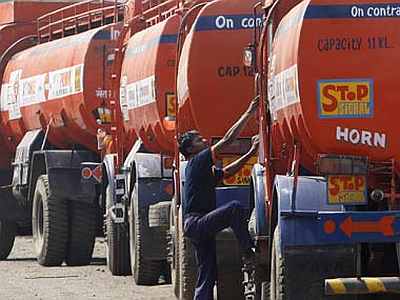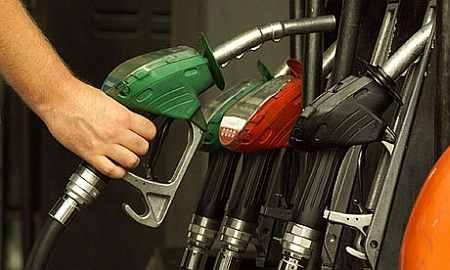Photographs: Reuters Business Standard in New Delhi
The complex pricing mechanism will give rise to bribery and law-breaking.
Complex pricing of energy always causes a cascading set of problems. Consider the recent decision taken by the United Progressive Alliance government to allow oil marketing companies the freedom to alter diesel prices at the pump in small doses.
The idea is to eventually wipe out under-recoveries - losses on each litre of diesel sold - which eventually find their way into the government's accounts and push up the fiscal deficit, already unsustainably high.
There is no question that this is a long overdue and sensible move, and also that the slow adjustment process will minimise political impact.
But there are significant problems even now with the associated idea of dual pricing - that subsidies will be handed out only at the pump, with other, "bulk" consumers being ineligible.
Such dual pricing formulations are asking for trouble. Many smaller industrial and service units buy diesel in bulk; but it is more than possible that, now, they will choke the pump distribution network to access the subsidised price.
...
Why dual pricing of diesel will cause problems
Photographs: Reuters
Naturally, diversion will become common. In some cases, the subsidised diesel may not even arrive at the pump, being diverted en route.
Bribery will be used; and, worse, intimidation and physical violence. These are the inevitable consequences of a complex pricing system that incentivises law-breaking. The distortions caused by complex administrative pricing do not end there.
Frequently, the subsequent economic distortions cause additional policy interventions to try and minimise the effect - in other words, one government intervention causes another, remedial intervention, until a chain of such interventions begins to recreate the inefficiency and chaos of a command economy.
In the case of dual pricing, the government is considering treating sports utility vehicles, or SUVs, that run on diesel differently from petrol SUVs.
It is one thing to view these mammoth cars as inefficient forms of transportation that endanger all those on the road, and the ownership of which needs to be dis-incentivised.
...
Why dual pricing of diesel will cause problems
Photographs: Reuters
It may also make sense to attempt at equalising the tax burden between diesel and petrol cars, as the Kirit Parekh Committee recommended.
But it is quite different to attempt to make up for fuel under-recoveries from differential excise rates on these cars, when the under-recoveries are due to be phased out in any case.
A certain uniformity in taxation is a central principle of sound public finance. It minimises the arbitrariness of tax administration, and allows consumers to take more informed decisions.
It increases tax compliance if the code is clear, uniform and well-understood, with the minimum of exemptions and cesses. That, when applied to indirect taxes, is the central idea of, and the motivating force for, the goods and services tax or GST.
India is not just moving towards minimising diesel subsidies - it is also supposed to be preparing the way for the GST.
The government and the finance ministry must ask itself - are such complexities the way forward? Or the way back?





article